
As a leading authority on arms control and international security, Nancy Gallagher thinks that the new administration has an opportunity to improve U.S. - Iran relations. Gallagher, director of the Center for International and Security Studies at Maryland (CISSM), sees the Biden-Harris administration’s international policies as a chance for the United States to rejoin an agreement that six world powers worked out with Iran in 2015 to provide sanctions relief in return for tighter constraints and greater transparency into Iran’s nuclear program.
"You'd think [each administration handles arms control] very differently, but actually there's a lot of continuity. The same arguments we're having today are ones that date back to the '60s and '70s," said Gallagher.
Gallagher explains that "under the 1968 Nonproliferation Treaty, countries like Iran that have agreed never to acquire nuclear weapons can...engage in other dual-use nuclear activities so long as they let the International Atomic Energy Agency (IAEA) monitor their program to confirm that it is purely peaceful. “
Although this nuclear activity is monitored by the IAEA, some Americans believe it is politically feasible to prohibit countries they don’t trust from participating in nuclear activities. Gallagher conveys this is “a discriminatory stance that is unacceptable to the vast majority of countries in the world. The Trump administration withdrew from the nuclear deal and imposed more sanctions in hopes that maximum pressure would get more concessions from Iran, but that backfired."
Before coming to the School, Gallagher was the executive director of the Clinton administration's Comprehensive Test Ban Treaty Task Force and worked with the special advisor to the President and the secretary of state to build bipartisan support for U.S. ratification. Throughout her career, she's worked on a book project on strategic logics for arms control and developed cooperative strategies to reduce nuclear risks, enhance space security, and improve cybersecurity.
CISSM has conducted a series of in-depth public opinion polls in Iran by working with Ebrahim Mohseni and Amir Farmanesh, two experts with deep connections to that country who got their Ph.D’s from the School. It’s most recent survey shows that Iranians are eager for the United States to rejoin the Joint Comprehensive Plan of Action (JCPOA) and lift nuclear-related sanctions on Iran as promised, but are opposed to negotiating additional restrictions on Iran in return for more sanctions relief until the United States has fulfilled its JCPOA obligations for several years.
The United States is in a difficult position of regaining Iranian trust. Gallagher emphasizes the acute knowledge of how to “work the process and increase confidence” in an arms negotiation while also “[looking] over the horizon” of arms control and understanding how it affects other policy aspects such as cybersecurity.
Gallagher also underscored the demand for SPP students who understand the field of nuclear policy.
“The Trump administration tried to wipe out as much expertise on this as they could. There is a need for people who understand [the history and complexity] of these issues,” states Gallagher.
Gallagher will talk about the poll at the upcoming CISSM special event “Iranian Public Opinion in the Biden Era” on Feb. 24 at a panel discussion hosted by the Atlantic Council, a nonpartisan Think Tank.
The findings of earlier CISSM surveys of Iranian public opinion are available now and can be used by students in their research papers and capstone projects. Gallagher also presents the results in private briefings for U.S. officials and other interested governments. She explains that the policy decisions that come from this information are usually classified, but the information can be “important to decision making. [It] helps [policymakers] understand what steps would be relatively easy for the Iranian leadership, and what would be politically difficult, if not impossible, for them.”
Learn more about CISSM and register for “Iranian Public Opinion in the Biden Era” at spp.umd.edu.



